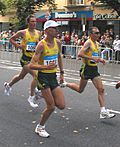This article may incorporate text from a large language model .(September 2025) |
Mountain marathon is a variant of fell running, typically held over two days, and often incorporates a strong orienteering element. Competitors usually participate in teams of two and must carry their own food, tent, and other essential gear. Events feature various classes (e.g., for the Original Mountain Marathon: Elite, A, B, C, D, and Long, Medium, and Short Score).

